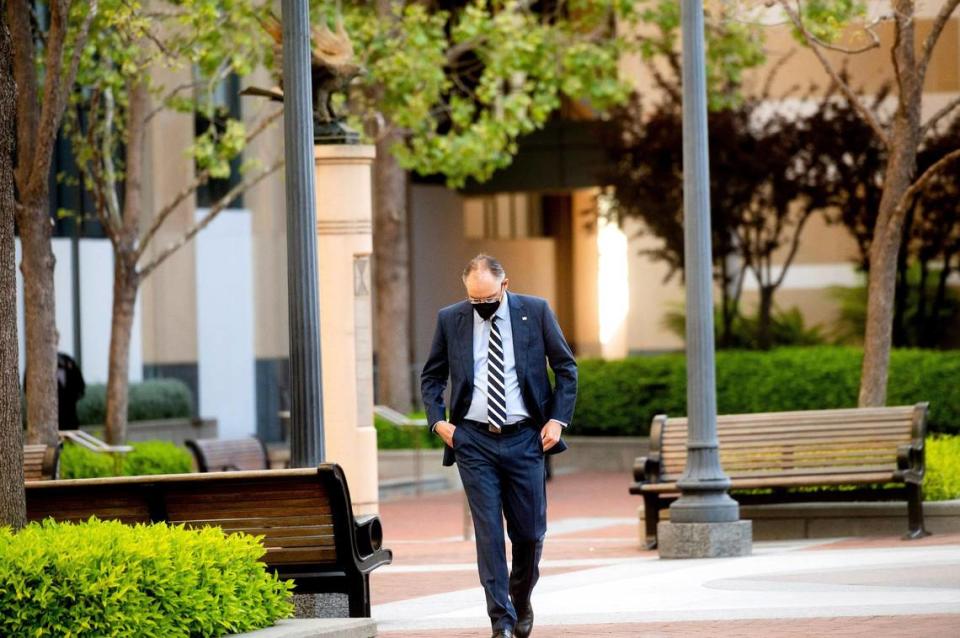Epic Games CEO Sweeney looks for silver lining as antitrust ruling goes Apple’s way
Tim Sweeney, the CEO of Epic Games and North Carolina’s second-richest person, had hoped for a different outcome earlier this week when appellate judges in San Francisco upheld a lower court ruling in Epic’s long-running, antitrust case against Apple.
“Apple prevailed at the 9th Circuit Court,” Sweeney acknowledged in a tweet Monday after the three-judge panel affirmed what a district court judge had determined two years ago: that Apple doesn’t maintain an unlawful monolopy through its App Store or in-app purchase system.
Apple called the judgment a “resounding victory” in an emailed statement to The News & Observer.
“For the second time in two years, a federal court has ruled that Apple abides by antitrust laws at the state and federal levels,” the company said. “The App Store continues to promote competition, drive innovation, and expand opportunity, and we’re proud of its profound contributions to both users and developers around the world.”
Will the latest Epic v. Apple ruling change how we buy apps?
The crux of the now almost three-year fight comes down to how Americans are allowed to access and pay for applications on their phones.
Apple doesn’t let iPhone users download apps outside the App Store or make in-app purchases outside Apple’s payment system. The company argues this closed “walled garden” approach is necessary to ensure the security of its iOS operating system.
Yet Sweeney, whose Cary-based company created the hit game Fortnite, has long criticized this policy — and the similar policy of Google — as being unfairly monopolistic. Both Apple and Google levy fees on every app purchase, up to 30%.
In August 2020, Sweeney introduced a new payment method for Fortnite phone players that bypassed Apple’s and Google’s systems. The two tech giants immediately booted Epic off their respective application stores, and Sweeney sued. Apple then countersued.
The district court trial lasted three weeks in the spring of 2021 and resulted in a split decision favoring Apple, which won nine of the 10 claims. The judge did find Apple was violating California’s Unfair Competition Law by banning app developers from mentioning or linking to alternative payment options outside the App Store.
Both sides appealed the decision and reconvened in November before the 9th Circuit Court of Appeals. The appellate court this week left the main tenets of May 2021 ruling unchanged.
“There is a lively and important debate about the role played in our economy and democracy by online transaction platforms with market power,” the appellate judges stated. “Our job as a federal Court of Appeals, however, is not to resolve that debate — nor could we even attempt to do so. Instead, in this decision, we faithfully applied existing precedent to the facts as the parties developed them.”
Whether Epic will be forced to cover Apple’s legal costs will be determined in a lower court.
The judges did again side with Epic by finding Apple’s anti-steering policy violated California law. Even though it just pertains to one state, this ruling will likely change how major developers nationwide sell their apps, says Florian Ederer, an associate professor of economics at the Yale School of Management.
“It’s going to allow many of these apps to tell their customers that they can probably get a better deal on their own website,” Ederer said. “It’s probably going to lead to a separation of those types of companies that are willing to invest a little bit more into their payment systems.”
Would Sweeney or Apple take the case to the Supreme Court?
On Twitter, Sweeney said the court’s decision to reject Apple’s steering restriction will free “iOS developers to send consumers to the web to do business with them directly there.”
Epic Games said it did not have additional comment on the case. Both Sweeney and Apple say they will now consider any additional action, which could involve an appeal to the Supreme Court.
“We’re working on next steps,” Sweeney wrote on Monday.
Fortunately, the court's positive decision rejecting Apple's anti-steering provisions frees iOS developers to send consumers to the web to do business with them directly there. We're working on next steps.
— Tim Sweeney (@TimSweeneyEpic) April 24, 2023
Getting the case before the highest court in the country won’t be easy. In a typical year, the Supreme Court only hears between 100 to 150 of the thousands of cases that go through appellate courts.
And since the Court of Appeals hearing, Epic has agreed to pay the Federal Trade Commission a record $520 million fine over complaints the company violated children’s privacy law and induced unintended purchases through deceptive designs.
Sweeney, a billionaire, has the deep pockets to try to keep fighting Apple, but the combination of the FTC fine and the latest court defeat could dictate what he decides.
“It’s hard to see how any higher courts are going to majorly change the opinion on on this,” Ederer said. “The antitrust courts are very conservative. They tend to be very, very hesitant to overrule prior previous rulings.”
This story was produced with financial support from a coalition of partners led by Innovate Raleigh as part of an independent journalism fellowship program. The N&O maintains full editorial control of the work.
Open Source
Do you enjoy Triangle tech news? Subscribe to Open Source, The News & Observer's weekly technology newsletter and look for it in your inbox every Friday morning. Sign up here.




